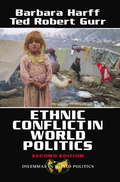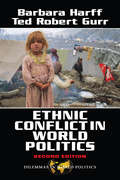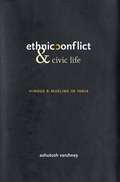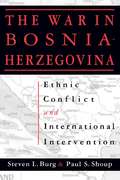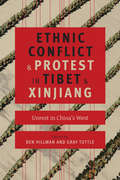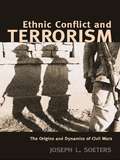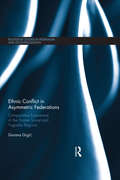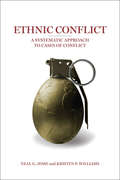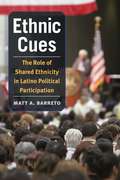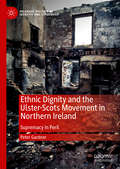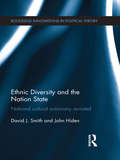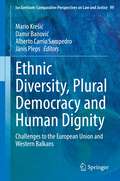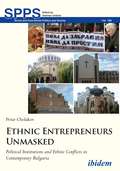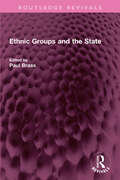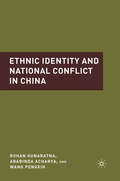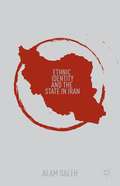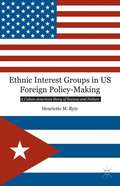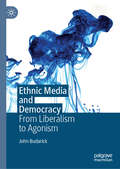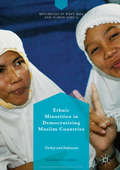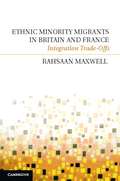- Table View
- List View
Ethnic Conflict In World Politics
by Barbara Harff Ted Robert GurrThis second edition of Ethnic Conflict in World Politics is an introduction to a new era in which civil society, states, and international actors attempt to channel ethnic challenges to world order and security into conventional politics. From Africa's post-colonial rebellions in the 1960s and 1970s to anti-immigrant violence in the 1990s the authors survey the historical, geographic, and cultural diversity of ethnopolitical conflict. Using an analytical model to elucidate four well-chosen case studies-the Kurds, the Miskitos, the Chinese in Malaysia, and the Turks in Germany-the authors give students tools for analyzing emerging conflicts based on the demands of nationalists, indigenous peoples, and immigrant minorities throughout the world. The international community has begun to respond more quickly and constructively to these conflicts than it did to civil wars in divided Yugoslavia and genocide in Rwanda by using the emerging doctrines of proactive peacemaking and peace enforcement that are detailed in this book. Concludes by identifying five principles of international doctrine for managing conflict in ethnically diverse societies. The text is illustrated with maps, tables, and figures.
Ethnic Conflict In World Politics
by Barbara Harff Ted Robert GurrThis second edition of Ethnic Conflict in World Politics is an introduction to a new era in which civil society, states, and international actors attempt to channel ethnic challenges to world order and security into conventional politics. From Africa's post-colonial rebellions in the 1960s and 1970s to anti-immigrant violence in the 1990s the authors survey the historical, geographic, and cultural diversity of ethnopolitical conflict. Using an analytical model to elucidate four well-chosen case studies--the Kurds, the Miskitos, the Chinese in Malaysia, and the Turks in Germany--the authors give students tools for analyzing emerging conflicts based on the demands of nationalists, indigenous peoples, and immigrant minorities throughout the world. The international community has begun to respond more quickly and constructively to these conflicts than it did to civil wars in divided Yugoslavia and genocide in Rwanda by using the emerging doctrines of proactive peacemaking and peace enforcement that are detailed in this book. Concludes by identifying five principles of international doctrine for managing conflict in ethnically diverse societies. The text is illustrated with maps, tables, and figures.
Ethnic Conflict In World Politics
by Barbara Harff Ted Robert GurrThis second edition of Ethnic Conflict in World Politics is an introduction to a new era in which civil society, states, and international actors attempt to channel ethnic challenges to world order and security into conventional politics. From Africa's post-colonial rebellions in the 1960s and 1970s to anti-immigrant violence in the 1990s the authors survey the historical, geographic, and cultural diversity of ethnopolitical conflict. Using an analytical model to elucidate four well-chosen case studies-the Kurds, the Miskitos, the Chinese in Malaysia, and the Turks in Germany-the authors give students tools for analyzing emerging conflicts based on the demands of nationalists, indigenous peoples, and immigrant minorities throughout the world. The international community has begun to respond more quickly and constructively to these conflicts than it did to civil wars in divided Yugoslavia and genocide in Rwanda by using the emerging doctrines of proactive peacemaking and peace enforcement that are detailed in this book. Concludes by identifying five principles of international doctrine for managing conflict in ethnically diverse societies. The text is illustrated with maps, tables, and figures.
Ethnic Conflict In World Politics (Dilemmas in World Politics )
by Barbara HarffThis second edition of Ethnic Conflict in World Politics is an introduction to a new era in which civil society, states, and international actors attempt to channel ethnic challenges to world order and security into conventional politics. From Africa's post-colonial rebellions in the 1960s and 1970s to anti-immigrant violence in the 1990s the authors survey the historical, geographic, and cultural diversity of ethnopolitical conflict. Using an analytical model to elucidate four well-chosen case studies?the Kurds, the Miskitos, the Chinese in Malaysia, and the Turks in Germany?the authors give students tools for analyzing emerging conflicts based on the demands of nationalists, indigenous peoples, and immigrant minorities throughout the world. The international community has begun to respond more quickly and constructively to these conflicts than it did to civil wars in divided Yugoslavia and genocide in Rwanda by using the emerging doctrines of proactive peacemaking and peace enforcement that are detailed in this book. Concludes by identifying five principles of international doctrine for managing conflict in ethnically diverse societies. The text is illustrated with maps, tables, and figures.
Ethnic Conflict and Civic Life: Hindus and Muslims in India
by Ashutosh VarshneyThis timely book, updated for the paperback edition, examines how civic ties between Hindus and Muslims in different Indian cities serve to contain, or even prevent, ethnic violence. It is of interest not only to South Asian scholars and policymakers but also to those studying multiethnic societies in other areas of the world.
Ethnic Conflict and International Intervention: Crisis in Bosnia-Herzegovina, 1990-93
by Steven L. Burg Paul S. ShoupThis book examines the historical, cultural and political dimensions of the crisis in Bosnia and the international efforts to resolve it. It provides a detailed analysis of international proposals to end the fighting, from the Vance-Owen plan to the Dayton Accord, with special attention to the national and international politics that shaped them. It analyzes the motivations and actions of the warring parties, neighbouring states and international actors including the United States, the United Nations, the European powers, and others involved in the war and the diplomacy surrounding it. With guides to sources and documentation, abundant tabular data and over 30 maps, this should be a definitive volume on the most vexing conflict of the post-Soviet period.
Ethnic Conflict and Protest in Tibet and Xinjiang: Unrest in China's West
by Ben Hillman Gray TuttleDespite a decade of rapid economic development, rising living standards, and large-scale improvements in infrastructure and services, China's western borderlands have experienced a wave of ethnic unrest not seen since the 1950s. Through on-the-ground interviews and first-hand observations, the international experts in this volume create an invaluable record of the conflicts and protests as they have unfolded-the most extensive chronicle of events to date. The authors examine the factors driving the unrest in Tibet and Xinjiang and the political strategies used to suppress them. They also explain why certain areas have seen a higher concentration of ethnic-based violence than others. For anyone struggling to understand the origins of unrest in contemporary Tibet and Xinjiang, this anthology is essential reading.
Ethnic Conflict and Protest in Tibet and Xinjiang: Unrest in China's West (Studies of the Weatherhead East Asian Institute, Columbia University)
by Ben Hillman Gray TuttleDespite more than a decade of rapid economic development, rising living standards, and large-scale improvements in infrastructure and services, China's western borderlands are awash in a wave of ethnic unrest not seen since the 1950s. Through on-the-ground interviews and firsthand observations, the international experts in this volume create an invaluable record of the conflicts and protests as they have unfolded—the most extensive chronicle of events to date. The authors examine the factors driving the unrest in Tibet and Xinjiang and the political strategies used to suppress them. They also explain why certain areas have seen higher concentrations of ethnic-based violence than others.Essential reading for anyone struggling to understand the origins of unrest in contemporary Tibet and Xinjiang, this volume considers the role of propaganda and education as generators and sources of conflict. It links interethnic strife to economic growth and connects environmental degradation to increased instability. It captures the subtle difference between violence in urban Xinjiang and conflict in rural Tibet, with detailed portraits of everyday individuals caught among the pressures of politics, history, personal interest, and global movements with local resonance.
Ethnic Conflict and Terrorism: The Origins and Dynamics of Civil Wars (Contemporary Security Studies)
by Joseph L. SoetersIn the early 1990s a number of violent civil wars and large-scale ethnic crises shocked the world. In Rwanda, Bosnia, Chechnya and elsewhere atrocities were committed that led to hundreds of thousands of dead and displaced people. Explaining the origins and dynamics of such inhuman actions and events, this new sensitive and detailed analysis includes: full analysis of the origins of civil wars, terrorism and ethnic strife insights drawn from across the social sciences practical and topical illustrations of the information provided fully updated assessments with details of key contemporary events Although the number of these conflicts has diminished over the years, the phenomenon has not disappeared: in the Sudan, the Congo, Sierra Leone, Liberia, Nigeria, Afghanistan and Iraq people are still being killed in large numbers, without authorities being able to avert or end the hostilities. On nine-eleven large-scale terrorist attacks in Washington and New York shocked the world again, and since then other violent events took place in Bali, Casablanca, Riyadh, Moscow, Istanbul and Madrid. This book of concern to all people, because recent history has shown us that such violence can strike everywhere and at any time. The final chapter delivers a number of constructive considerations aiming at the development of policies to prevent and stop such conflicts. This is an important new contribution to tackling the complex challenges of the twenty first century. This book will be of great interest to all students and scholars of contemporary history, development studies, political and social sciences and International Relations.
Ethnic Conflict in Asymmetric Federations: Comparative Experience of the Former Soviet and Yugoslav Regions (Routledge Studies in Federalism and Decentralization)
by Gorana GrgićIn the last years of their existence, the Union of Soviet Socialist Republics (USSR) and the Socialist Federal Republic of Yugoslavia (SFRY) found themselves facing a similar and very grim state of affairs. After their disintegration, the former Yugoslav republics spiralled into a set of ethnic conflicts that did not leave a single one of them unscathed, and in the ex-Soviet space, conflicts were far more limited. This book offers an in-depth analysis of the difference in state collapses and ensuing conflicts in the Soviet Union and Yugoslavia by focusing on their asymmetric ethnofederal structure and the different dynamics of ethnic mobilization that the federal units experienced. Moreover, it explores the links between identity politics and international relations, as the latter has been a latecomer in research on ethnonationalism and ethnic conflict. Finally, it contributes to the literature on the democratization-conflict nexus by proposing that the sequencing of ethnic mobilization and political liberalization has significant effects on the likelihood of conflict. This text will be of key interest to scholars and students of Post-Soviet politics, Balkan politics, ethnic conflict, peace and conflict studies, federalism, and more broadly to comparative politics and international relations.
Ethnic Conflict: A Systematic Approach to Cases of Conflict
by Neal G. Jesse Kristen P. WilliamsAs ethnic groups clash, the international community faces the challenge of understanding the multiple causes of violence and formulating solutions that will bring about peace. Allowing for greater insight, Jesse and Williams bridge two sub-fields of political science in Ethnic Conflict—international relations and comparative politics. They systematically apply a “levels of analysis” framework, looking at the individual, domestic, and international contexts to better explore and understand its complexity. Five case study chapters apply the book’s framework to disputes around the world and include coverage of Bosnia, the Israeli-Palestinian conflict, Northern Ireland, Sri Lanka, and Sudan. Never losing sight of their analytical framework, the authors provide richly detailed case studies that help students understand both the unique and shared causes of each conflict. Students will appreciate the book’s logical presentation and excellent pedagogical features including detailed maps that show political, demographic, and cultural data.
Ethnic Cues: The Role of Shared Ethnicity in Latino Political Participation
by Matt A. Barreto"Matt Barreto investigates some of the ramifications of two new related developments in American political life: the stunning growth of the Latino immigrant population in recent decades and the accompanying exponential explosion in the number of Latino candidates running for political office at the local, state, and national levels. " ---Reuel Rogers, Northwestern University Until recently, much of the research on political participation has resisted the idea that Latino voters rely on ethnic cues. The discussion has become increasingly salient as political strategists have learned to define individual voting blocs and mobilize them in support of a candidate. Nourished by the debate over immigration, the search for the Latino voter has now blossomed into a national political obsession. Against this background, Matt Barreto assays the influence of ethnic identification on Latinos' voting behavior. Barreto asks whether the presence of co-ethnic candidates actually does mobilize Latino voters in support of these candidates. His analysis of in-depth candidate interviews, public opinion surveys, official election results, and statistics finds that it does. He goes on to describe the dynamic of voting in the Latino community and sharpens our appreciation of how ethnic considerations influence the electoral choices of Americans more generally. In a time of intensely focused campaign appeals, Barreto's work has much to tell us about the mechanics of public opinion and the role of race and ethnicity in voting behavior. Matt A. Barreto is Associate Professor of Political Science at the University of Washington and Director of the Washington Institute for the Study of Ethnicity, Race, and Sexuality (WISER).
Ethnic Dignity and the Ulster-Scots Movement in Northern Ireland: Supremacy in Peril (Palgrave Politics of Identity and Citizenship Series)
by Peter GardnerIn this book, Peter Gardner contends that the production of narratives of ethnic peoplehood is an attempt to regain a sense of collective dignity among the previously dominant. After introducing the concept of ethnic dignity and locating its place within postconflict identity politics, Gardner focuses his analysis on the Ulster- Scots story of peoplehood. Drawing on a wealth of primary data, the chapters explore a variety of core issues including ethnopolitics, social class, political-economic ideology, colonialism, and heteromasculinity. The book concludes by taking a global view of post-conflict ethnic dignity among the once dominant, analysing the New Afrikaans movement in South Africa, white pride and ethnic whiteness studies, and Maronite Phoenicianism in Lebanon. This will be an important contribution for students and scholars of ethnicity, divided societies and, more broadly, political sociology.
Ethnic Diversity and the Nation State: National Cultural Autonomy Revisited (Routledge Innovations in Political Theory)
by David J. Smith John HidenThis book explores a largely forgotten legacy of multicultural political thought and practice from within Eastern Europe and examines its relevance to post-Cold War debates on state and nationhood. Featuring a Preface by former UK Home Secretary Charles Clarke, it weaves theory and practice to challenge established understandings of the nation state. Eastern Europe is still too often viewed through the prism of ethnic conflict, which overlooks the region’s positive contribution to modern debates on the political management of ethno-cultural diversity, and towards the construction of a united Europe ‘beyond the nation-state’. Based on extensive archival research in Estonia, Latvia, Germany, Russia, as well as the League of Nations Archive in Geneva, this book explores this neglected multicultural legacy and assesses its significance in the post-Cold War era, which has seen the reappearance of national cultural autonomy laws in several states of Eastern Europe. Ethnic Diversity and the Nation State is invaluable reading for students and scholars of political science, history, sociology and European studies, and also for policy makers and others interested in minority rights and ethnic conflict regulation.
Ethnic Diversity, Plural Democracy and Human Dignity: Challenges to the European Union and Western Balkans (Ius Gentium: Comparative Perspectives on Law and Justice #99)
by Jānis Pleps Damir Banović Mario Krešić Alberto Carrio Sampedro“Given their ethnic diversity, to what extent, and at what cost and benefit to human dignity, can European countries adopt and adapt plural democracy?” The contributors to this volume offer answers to this question from a variety of multidisciplinary perspectives within the framework of the integral theory of law and the state. Their shared aim is to explain legal phenomena in the context of other relevant issues and to identify, analyse and critique conceptualizations, problems and situations. This volume is rooted in the historical and contemporary European experience with special cases from Bosnia and Hercegovina, Croatia, Latvia, Slovenia, Spain and Canada which are relevant for understanding the European problem. Solutions to the problem are sought through innovative interpretations of the rule of law, democracy and human dignity, which are followed by argumentation about how these concepts, when recognized as European legal principles, can be implemented in order to avoid ethnic conflicts.Following an introduction that defines the problem at the centre of the book and explains how legal theory can be used to address it, the book consists of eleven contributions divided into three thematic sections. The first covers topics concerning the European principles which can help avoid ethnic conflicts: the principle of compulsory adjudication in interstate relations, the principle of democracy, and principles regarding the recognition of individual and collective identities. These European principles are then investigated by drawing on legal and political theories. The second section presents three ways of conceptualizing ethnical needs in multi-ethnic states: asymmetric federalism, dêmoicratic account and cooperative federalism. The third and final section elaborates on issues concerning the protection of minority rights: the role of judicial ideology in protecting minority rights, citizenship, the EU mechanism for the protection of minority rights, and the importance of remembering tragic events affecting minorities.
Ethnic Entrepreneurs Unmasked: Political Institutions and Ethnic Conflicts in Contemporary Bulgaria (Soviet And Post-soviet Politics And Society Ser. #189)
by Petar CholakovBased on an institutional approach to ethnic conflict, Petar Cholakov highlights the idiosyncrasies of, and the challenges to, interethnic relations in Bulgaria. He traces the emergence of the currently implemented Bulgarian ethnic model in its interconnection with the party system, and especially examines the ideology, political support, and mobilization tools employed by the Movement for Rights and Freedoms (MRF) party as well as the populist radical right. Cholakov presents findings from case studies on Bulgaria’s Roma, crime, and politics. He analyzes Bulgarian integration policies and assesses the role of Bulgaria’s judiciary as well as contemporary antidiscrimination legislation, in particular, of the 2004 Protection against Discrimination Act. The monograph peruses decisions of, among others, the European Court of Human Rights and uncovers patterns of discrimination against Roma. By reverse engineering the Bulgarian ethnic model, Cholakov reveals how the institutions operate and comes to the conclusion that interethnic peace has been entrusted to a defective mechanism which institutionalizes ethnic cleavage and politicizes identity. On the basis of his in-depth analysis, the author makes a prognosis for the future of ethnic relations in Bulgaria and provides recommendations for reforms.
Ethnic Frontiers And Peripheries: Landscapes Of Development And Inequality In Israel
by Oren Yiftachel Avinoam Meir"The idea for editing this book originated during an international conference titled ""Regional Development: The Challenge of the Frontier,"" held in December 1993 at the Dead Sea and which was organized by the Negev Center for Regional Development at Ben-Gurion University of the Negev. In this conference we noticed that little has been said about the impact of Israel's complex mosaic of ethnic groups on the shaping of the country's social and spatial frontiers. We have therefore endeavored to bring together a number of perspectives on the evolution of ethnic frontiers in Israel and the role they play in shaping the cultural landscape of this country. Yet we later realized that ""frontier"" is too limited a term, and that it may through various processes have turned into a mosaic of spatial, social, economic, and political peripheries. More specifically we attempted to present the process of frontier development as perceived by Israel's ethnic and national minorities. We therefore invited contributions from various other Israeli experts on these issues: geographers, sociologists, anthropologists, and political scientists, which have now become the main body of chapters in this book. We trust that they are representative of the main dimensions of the subject."
Ethnic Groups and the State (Routledge Revivals)
by Paul BrassFirst published in 1985, Ethnic Groups and the State examines the effects of the state, its official ideologies, its structural forms and its specific policies upon the formation of ethnic identity. It is argued that the formation of ethnic identity is viewed as a process that involves three sets of struggles. One takes place within the ethnic group itself for control over its material and symbolic resources. The second takes place between ethnic groups, as a competition for rights, privileges, and available resources. The third takes place between the state and the groups that dominate it on the one hand and the population that inhabits its territory on the other. This issue is viewed both from a historical and contemporary political standpoint, and the impact of ethnic issues in a wide range of cultures is assessed. This book will be of interest to students of history, sociology, political science and ethnic studies.
Ethnic Identity and National Conflict in China
by Rohan Gunaratna Arabinda Acharya Wang PengxinWhile, not discounting the potency of the radical Islamic religious discourse in fuelling the contemporary wave of terrorism, this book makes an attempt to explain terrorism in China as an ethno-nationalist conflict rooted in issues involving minority identity. However, a largely domestic conflict is being hijacked by the radical Islamists.
Ethnic Identity and the State in Iran
by Alam SalehWhile the Islamic Republic has employed various strategies to mitigate the worst excesses of inter-ethnic tension while still securing a Shi'a dominated "Persian hegemony," the systematic neglect of ethnic groups by both the Islamic Republic and its predecessor regime has resulted in the politicization of ethnic identity in Iran.
Ethnic Interest Groups In Us Foreign Policy–making
by Henriette M. RytzThis book comprises the first systematic study on the impact of ethnic interest groups on US foreign policy, using the case study of how the Cuban?American National Foundation (CANF) influenced the outcome of three different legislatives debates that directly affected US Cuba policy.
Ethnic Media and Democracy: From Liberalism to Agonism
by John BudarickPlacing ethnic media within the context of democratic theory, this book suggests novel ways of thinking about media from the margins. After discussing ethnic media research and defining the concept, John Budarick provides a succinct and in depth discussion of liberal democracy, deliberative democracy and agonistic pluralism, critiquing the explanatory and normative power of each in relation to media, journalism and ethnic diversity. Ultimately, Ethnic Media and Democracy demonstrates the power of agnostic pluralism, an underused theory in media studies that provides a framework for analysing ethnic media. By using this unique approach, the book engages with some of the most pressing issues in the fields of media, politics and democracy, and prompts innovation in the application of traditional models.
Ethnic Minorities and Politics in Post-Socialist Southeastern Europe
by Sabrina Ramet Marko ValentaSoutheast European politics cannot be understood without taking ethnic minorities into account. This book provides a comprehensive introduction to the politics of ethnic minorities, examining both their political parties and issues of social distance, migration, and ethnic boundaries, as well as issues related to citizenship and integration. Coverage includes detailed analyses of Hungarian minority parties in Romania, Albanian minority parties in Macedonia, Serb minority parties in Croatia, Bosniak minority parties in Serbia, and various minority parties in Montenegro, as well as the Movement for Rights and Freedoms, a largely Turkish party, in Bulgaria.
Ethnic Minorities in Democratizing Muslim Countries: Turkey And Indonesia (Minorities in West Asia and North Africa)
by Maurizio GeriThis book explores the ways in which democratizing Muslim countries treat their ethnic minorities’ requests of inclusiveness and autonomy. The author examines the results of two important cases—the securitization of Kurds in Turkey and the “autonomization” (a new concept coined by the study) of Acehnese in Indonesia—through multiple hypotheses: the elites’ power interest, the international factors, the institutions and history of the state, and the ontological security of the country. By examining states with ethnic diversity and very little religious diversity, the research controls for the effect of religious conflict on minority inclusion, and so allows expanded generalizations and comparisons. In non-Muslim majority countries, and in so called “mature democracies,” the problem of the inclusion of old or new ethnic minorities is also crucial for the sustainability of the “never-ending” democratization processes.
Ethnic Minority Migrants in Britain and France
by Rahsaan MaxwellThis book addresses why some ethnic minority migrant groups have better economic and political integration outcomes than others. The central claim is that social integration leads to trade-offs with economic and political integration. The logic behind this claim is that socially segregated groups may have difficulties interacting with mainstream society but will have more capacity for group mobilization. That mobilization can improve economic and political integration. In comparison, socially integrated groups may have greater capacity to interact with mainstream society but also less likelihood of developing significant group mobilization resources. As a result, this can limit their economic and political integration outcomes. Rahsaan Maxwell develops this argument with evidence from Britain and France, claiming that similar group-level dynamics exist despite numerous national-level contextual differences, and provides a brief extension of the argument to The Netherlands and the United States.
